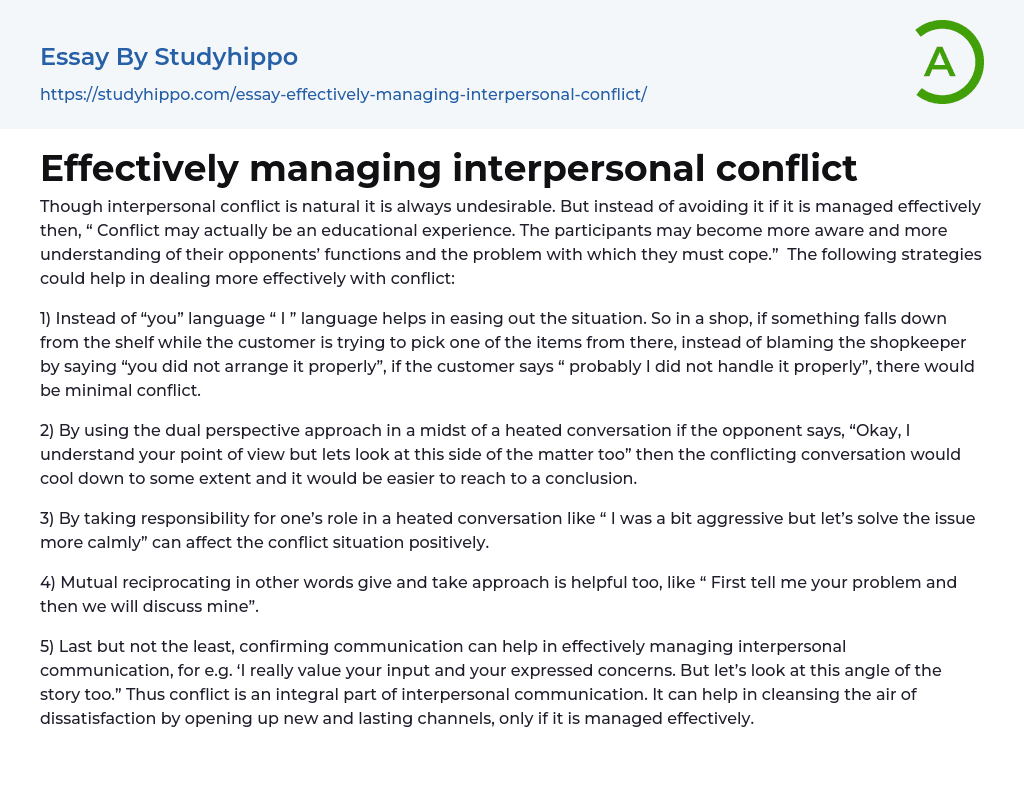It's not unusual for people to have disagreements, though they are generally unwelcome. However, if managed appropriately, these disputes can transform into instructive events that aid individuals in comprehending their colleagues' responsibilities and the subject matters they need to deal with thoroughly. The following are some techniques for handling conflict more effectively:
1) Opting for "I" language over "you" language can aid in defusing a tense situation. Consider, for example, in a store where a customer unintentionally drops an item when attempting to take it off the shelf. If instead of blaming the owner by uttering "you didn't set it up correctly", the customer says "maybe I didn't grasp it properly", this could significantly reduce possible confrontations.
2) The implementation of a dual perspective approach during an intense discussion can mitigate tension, especially when th
...e other party says, "Okay, I understand your stand, but let's also take this point into consideration." This method simplifies reaching a consensus.
3) Taking accountability for one's own actions in an intense discussion such as saying, "I might have been somewhat assertive, but let's resolve the issue more peacefully" can positively impact the conflict situation.
4) Adopting a twofold approach of exchange, essentially a 'give and take' technique, can also assist. This can be summarized as "Firstly, share your issue with me, after which we can delve into mine".
5) Lastly but importantly, establishing clear understanding through communication is pivotal in handling interpersonal communication efficiently. For instance, one could say, 'I truly appreciate your perspective and voiced worries. However, let's also consider this side of the situation.' Hence, disagreements and conflicts are
inherent aspects of interpersonal communication. They can aid in clearing the atmosphere of discontent by creating enduring communication pathways, provided they are managed appropriately.
- Code of Ethics essays
- Conflict essays
- Dress Code essays
- Human Resources essays
- Organizational Behavior essays
- Performance essays
- Recruitment essays
- Safety essays
- Arranged Marriage essays
- Communication essays
- Conflict Management essays
- Conflict Resolution essays
- Connection essays
- Conversation essays
- Dating essays
- Friendship essays
- Mediation essays
- Communication Skills essays
- Cross-Cultural Communication essays
- Effective Communication essays
- Greeting essays
- Intercultural Communication essays
- Interpersonal Communication essays
- Nonverbal Communication essays
- Orality essays
- Abnormal Psychology essays
- Abraham Maslow essays
- Attachment Theory essays
- Authority essays
- Behaviorism essays
- Classical Conditioning essays
- Cognitive Psychology essays
- Counseling essays
- Developmental Psychology essays
- Educational Psychology essays
- Erik Erikson essays
- Family Therapy essays
- Jean Piaget essays
- Maslow's Hierarchy Of Needs essays
- Mental Health essays
- Operant Conditioning essays
- Personality Psychology essays
- Positive Psychology essays
- Psychoanalysis essays
- Psychotherapy essays
- Sigmund Freud essays
- Social Psychology essays
- Stanford Prison Experiment essays
- Supersize Me essays




